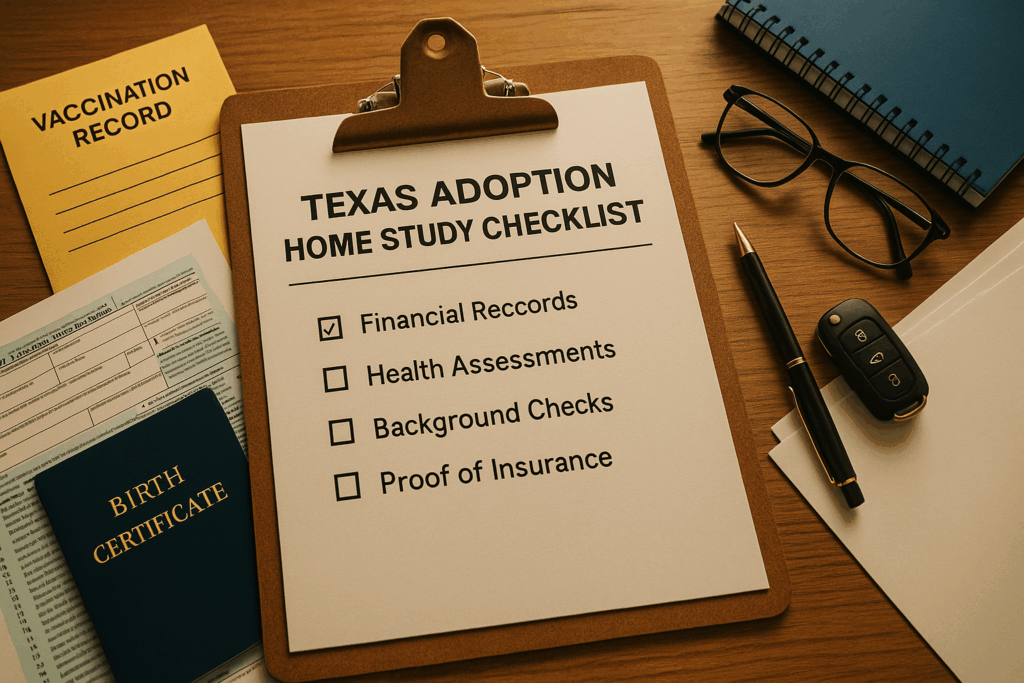
Ever tried assembling IKEA furniture without the manual? One minute you’re confident, the next you’re holding five screws and a wooden peg wondering where it all went wrong. That’s exactly how adoption can feel when you first hear the term Texas Adoption Answers Home Study Checklist—like someone handed you a life-changing project with no clear roadmap. But don’t worry, we’re here to make sure you don’t miss a single step on your path to parenthood.
At The Law Office of Bryan Fagan, PLLC, we’ve helped countless families navigate this process with confidence and clarity. The Texas Adoption Answers Home Study Checklist is more than just a list—it’s the foundation of your adoption journey in Texas. It includes everything from safety checks and interviews to financial paperwork and parenting readiness. Sound intense? It can be—but with the right guidance, it’s completely doable.
In this blog, we’ll walk you through each part of the checklist with real-world insight, legal clarity, and a few sanity-saving tips along the way. Whether you’re adopting through an agency, kinship placement, or the foster system, you’ll learn how to prepare your home, your family, and your mindset. And because we believe in protecting your future while educating your family, we’ll show you how to turn a daunting process into a confident next step toward bringing your child home. Stick around—you’ll want to read this to the end.
Key Takeaways
- The Texas adoption home study is a mandatory assessment to evaluate prospective adoptive parents’ readiness and suitability for adoption, involving home inspections, interviews, and document verifications.
- Key documentation required for the home study includes financial records, health assessments, criminal background checks, and proof of insurance, which collectively demonstrate the family’s stability and preparedness to adopt.
- Creating a safe and nurturing home environment is essential for passing the home study; adopting families must focus on child-proofing their homes and establishing supportive routines to ensure the well-being of the adopted child.

Your Adoption Journey Starts Here
Don’t navigate the adoption process alone. Schedule a consultation today and receive the expert guidance and support you need to build the family of your dreams.
Understanding the Texas Adoption Home Study
The Texas Adoption Answers Home Study Checklist is more than just a set of requirements—it’s a vital step in ensuring that adoptive families are emotionally, legally, and logistically prepared to welcome a child into their lives. Under Texas Family Code § 162.003 and § 162.0085, a home study is legally mandated in nearly all adoption cases, whether the placement is domestic, international, private, or through the Department of Family and Protective Services (DFPS).
This evaluation, conducted by a licensed social worker or adoption evaluator, involves an in-depth review of the family’s living environment, personal history, health, finances, and interpersonal dynamics. Interviews with each household member are conducted to assess parenting philosophy, relationship stability, support systems, and motivations for adopting. These insights are then compiled into a comprehensive home study report, which plays a key role in the court’s determination of adoption suitability.
As our family law team often advises, preparation is everything. A well-organized approach—gathering documentation, completing background checks, and ensuring your home is child-safe—can make the process much smoother. Maintaining open communication with your evaluator and agency is equally important, especially since the final home study report will be submitted to both the agency and the court for approval.
Whether you’re adopting a child from within Texas or abroad, this process ensures that families are ready not just on paper—but in heart, home, and habit. For a detailed breakdown of what this process entails, visit the Texas Adoption Answers Home Study Checklist, where we outline each requirement step-by-step.
For further insights into the broader adoption process, including legal timelines and court procedures, you can also read our blog post on How Long Does Adoption Take in Texas? At every stage, our attorneys are here to guide you with compassionate legal counsel and a commitment to protecting your family’s future.

Required Documents for Texas Adoption Home Study
Collecting the right paperwork is a cornerstone of completing the Texas Adoption Answers Home Study Checklist, and it’s one of the first things prospective adoptive parents should begin organizing. Under Texas Family Code § 162.003(b), families are required to provide key documents such as birth certificates, tax returns, vaccination records, valid photo IDs, and—if applicable—military discharge papers. These records help paint a full picture of the family’s stability, background, and readiness to provide a safe and nurturing home.
In addition to personal and financial documentation, Texas law mandates that all adult household members complete state and federal background checks, as well as child abuse and neglect registry screenings. Proof of current insurance policies—including home, health, auto, and life—must also be submitted to show that the family is financially equipped to handle the responsibilities of adoption. These requirements aren’t just boxes to check—they’re protective measures for the child’s future.
Adoption agencies often assist families in gathering these documents, offering guidance on securing necessary health evaluations and verifying financial stability. As our legal team frequently advises, staying organized and keeping an open line of communication with your evaluator can help you avoid delays. It’s also helpful to understand what happens after the paperwork is submitted—review our guide to Texas post-adoption requirements to prepare for the next stage.
If you’re just beginning the process, our blog on what to expect during a Texas home study offers a detailed walkthrough to help you feel more confident. At The Law Office of Bryan Fagan, PLLC, we’re committed to making your adoption experience less overwhelming and more empowering—because every document submitted is a step closer to building the family you’ve been dreaming of.

Preparing for the Home Visit
The home visit is a critical part of the home study process, where a social worker assesses the suitability of your home environment for a child. It involves interviews with household members and a thorough home inspection. Preparing your home in advance can make this process smoother and less stressful.
Ensure your home is safe and child-friendly by checking that all locks are functional, smoke detectors are working, and electrical outlets are covered. These safety features are crucial for passing the home study inspection.
The home evaluation focuses on the environment’s suitability for a child. Ensure toxic substances, such as medications and cleaning products, are secured out of children’s reach or locked away. Child-proofing cabinets and installing safety gates on stairs are additional measures to enhance child safety.
Having a first aid kit readily available shows you are prepared to handle minor emergencies and prioritize home safety, demonstrating your ability to respond effectively and giving you a head start.
Taking these steps demonstrates to the social worker that your home is a safe and nurturing environment for an adopted child. Preparation is key, and addressing these areas allows you to approach the home visit with confidence, using an adoption home visit checklist.
Family Interviews and Personal History
Family interviews are a significant component of the home study process. Prospective adoptive parents provide autobiographical statements detailing their life history and reasons for adoption, helping the social worker understand their motivations and readiness. This contributes to their adoption story and the experiences of adoptive families.
The interview process explores candidates’ motivations and readiness for adopting a child. Questions may cover their philosophy on discipline, tolerance for defiance or aggression, and intended methods, providing insights into their parenting styles and approaches.
Prospective parents are asked about their childhood experiences and how these have shaped their parenting style approaches. They may show openness to accepting a child from difficult backgrounds and reflect on how their family dynamics will change with the addition of an adopted child.
Creating a secure and nurturing atmosphere is vital for the emotional health of an adopted child. Establishing a consistent daily routine helps adopted children feel secure and aids in building trust within the family. Open communication is crucial for fostering trust and nurturing the bond with an adopted child.
Thinking about potential interview questions in advance can help family members articulate their readiness for adoption. The home study process ends with a comprehensive report summarizing family interviews, background checks, and parenting readiness. Thorough preparation and open discussions help families successfully navigate this part of the home study.
Home Inspection Checklist
As part of the Texas Adoption Answers Home Study Checklist, the home inspection plays a vital role in confirming that your residence is physically safe, child-friendly, and compliant with state regulations. In accordance with Texas Family Code § 162.0085, prospective adoptive families must demonstrate that their home environment supports the well-being and safety of a child. This means ensuring the presence of functional smoke detectors, carbon monoxide detectors, and other basic safety infrastructure throughout the home.
Home evaluators also look closely at how potential hazards are managed. Medications, cleaning products, and other toxic substances should be securely stored out of children’s reach or locked in cabinets. Electrical outlets must be covered, and stairs should have safety gates installed. If firearms are present, they must be locked away separately from ammunition. These precautions, while sometimes overlooked, can be the difference between a pass and a request for corrections during your home study.
Evaluators will also consider household pets and how they interact with children. While Texas law doesn’t explicitly restrict pet ownership in adoptive households, social workers are trained to observe for signs of aggression or unpredictability. Ensuring pets are well-behaved, vaccinated, and safely integrated into the home environment demonstrates your awareness of potential safety concerns.
These safety standards not only help you pass the inspection—they reflect your long-term commitment to raising a child in a nurturing environment. To better understand the financial aspects of preparing your home and completing the overall process, visit our resource on the average cost of adoption in Texas. You may also find our blog on how to prepare for a Texas home study helpful as you get your space—and your heart—ready for this next chapter.

Financial and Health Assessments
Financial stability is a crucial aspect of the home study process. Prospective adoptive parents must demonstrate they are financially capable of providing for a child’s basic needs, including showing consistent income and stable employment history. Documents like pay stubs or employer letters illustrate financial capability. Additionally, adoptive parents should prepare a budget showing how they will cover child-related expenses. Assets like savings and property also demonstrate financial security and are essential for being financially stable to adoption agencies.
Health assessments are equally important. Prospective adoptive parents must disclose their general physical and mental health status during the home study. Family health history, particularly hereditary illnesses, should also be mentioned. Instances of alcohol or drug abuse must be disclosed.
Both financial and health stability are crucial to ensure a nurturing and supportive environment for the adopted child. Providing comprehensive financial and health information demonstrates prospective adoptive parents’ readiness and capability to provide a stable home.
Child Abuse Clearances and Background Checks
Child abuse clearances are mandatory for all household members aged 14 and older. These clearances ensure there are no histories of child abuse or neglect that could jeopardize the adopted child’s safety.
In addition to child abuse clearances, state and federal criminal background checks are conducted for all household members with a criminal history. These checks ensure the home environment is safe and suitable for a child.
Complying with these legal requirements demonstrates prospective adoptive parents’ commitment to providing a safe and nurturing home for the adopted child. This crucial step in the adoption process aims to protect the child’s well-being.
Tips for a Successful Home Study
Navigating the Texas Adoption Answers Home Study Checklist becomes significantly easier when you maintain open communication and a flexible mindset. As outlined in Texas Family Code § 107.0511, evaluators are tasked with assessing not just your living environment, but also your preparedness and willingness to engage meaningfully in the adoption process. Being transparent with your adoption specialist and responsive to feedback helps build trust and ensures that any concerns can be addressed early on.
Simple but meaningful preparations—like posting emergency contact information for poison control, your pediatrician, and local responders—show that safety and planning are already part of your parenting approach. A well-stocked first-aid kit is another small but telling detail. These touches reinforce your readiness to handle everyday parenting responsibilities and demonstrate that your household is equipped to meet a child’s needs.
Keeping everything organized is equally important. Store your home study documents, required records, and agency correspondence in one easily accessible place. Whether you’re waiting on background check results or scheduling a follow-up visit, knowing where everything is can reduce stress and keep you on schedule. Our team often recommends reviewing our blog on how to prepare for a Texas home study to help guide your process from start to finish.
For more in-depth answers to common adoption questions, visit the Texas Family Adoption FAQs page. At The Law Office of Bryan Fagan, PLLC, we’re here to ensure you feel confident, informed, and fully supported as you move through each step of this life-changing journey.

The Role of the Adoption Agency
Adoption professionals play a critical role in guiding families through the Texas Adoption Answers Home Study Checklist, offering both education and emotional support as you navigate this important step. According to Texas Family Code § 107.0511, evaluators must meet specific educational and licensing requirements to ensure the integrity of the home study process. Whether you’re working with a private agency or through the state, these professionals are trained to assess your home and family life comprehensively and with care.
Throughout the home study, multiple parties may become involved—from agency staff to state-licensed social workers—each contributing to a full picture of your readiness to adopt. This layered approach adds legitimacy to the evaluation and ensures that all critical aspects of your environment, parenting style, and lifestyle are carefully considered.
As our attorneys often remind clients, the best home study experiences come from open, honest communication with your adoption specialist. These professionals are there to help—not to judge. Keeping the lines of communication open allows for personalized guidance and faster resolution of any challenges that may arise along the way. It’s also essential to understand that confidentiality is built into the process; while the home study report may be shared with birth parents or legal authorities, your privacy remains a priority.
If you’re feeling uncertain about what’s ahead, or if you’d like to discuss your adoption journey with an experienced legal team, we invite you to reach out through our contact page. For more insight into preparing for a successful adoption, be sure to explore our article on how long adoption takes in Texas. At The Law Office of Bryan Fagan, PLLC, we’re committed to standing by families with practical legal guidance, clear answers, and heartfelt support every step of the way.

Potential Challenges and How to Overcome Them
Maintaining a positive attitude throughout the home study process is essential. Challenges may arise, but staying optimistic can contribute to a better outcome. It’s important to address any discrepancies found in your home study report with your caseworker promptly. Open communication can help resolve issues and ensure that your home study accurately reflects your readiness for adoption. If you have questions, don’t hesitate to contact your caseworker.
For divorcing or separating parents, maintaining strong communication with educators is crucial. Keeping teachers informed about your family’s situation can help them provide the necessary support for your child. This communication ensures that your child’s academic and emotional needs are met during this transition.
If your child is struggling emotionally, consider seeking therapy or counseling. Professional support can help your child navigate the changes and challenges associated with adoption or separation. By addressing these challenges proactively, you can create a more stable and supportive environment for your child.
The Importance of a Supportive Environment
Establishing a consistent, nurturing home environment is vital for the well-being of an adopted child. This involves creating routines and providing a stable atmosphere where the child feels safe and loved. A supportive environment can significantly impact the child’s emotional and mental health, helping them thrive in their new home and become mentally healthy.
Preparing existing children for the adoption is also crucial. Discussing what adoption means and involving them in the process can help ensure family harmony. It’s important to respect the adopted child’s need for personal space, especially for older children, as it promotes their autonomy and comfort.
Open communication and involvement in shared activities can help strengthen family bonds. Engaging in activities that the adopted child enjoys fosters trust and builds a nurturing relationship.
By creating a supportive and nurturing environment, you can help your adopted child adjust and thrive. The emotional health of the child is paramount, and efforts to create a stable and loving home can make a significant difference in their life.
Finalizing the Home Study Report
The completion of the home study results in a comprehensive report that summarizes the family’s background, relationships, and readiness to adopt. This report is a crucial part of the adoption process, as it is submitted to the appropriate authorities for review and approval.
Reviewing the home study report for any inaccuracies is essential before submission. Ensuring that all information is correct can prevent delays and complications in the adoption process.
Once finalized, the home study report is submitted to the applicable authorities for review and approval. This step is vital in confirming that the prospective adoptive parents are fully prepared to provide a loving and stable home for the adopted child.
By carefully reviewing and finalizing the home study report, you can ensure that your adoption journey continues smoothly. This report is a testament to your readiness and commitment to welcoming a child into your home.
Conclusion:
Adoption isn’t just a legal process—it’s a journey of heart, patience, and preparation. And while the Texas Adoption Answers Home Study Checklist might feel like a mountain of tasks, remember this: every box you check brings you one step closer to opening your home to a child who truly needs it. It’s not about perfection—it’s about showing that your family is ready to love, protect, and grow.
At The Law Office of Bryan Fagan, PLLC, we know how important that journey is. That’s why we’re committed to walking with you, answering your questions, and making sure you feel confident and supported every step of the way. Because behind every adoption checklist is a very real family—and we believe in helping yours thrive.
If you’re ready to take the next step, whether it’s getting started on your home study or building a solid adoption plan, don’t go it alone. Our experienced Texas Family Law Attorneys are here to guide you, advocate for you, and protect the future you’re building.
And hey—if you’ve made it this far, take a deep breath. You’re doing great. The paperwork will pass, the inspections will end, and one day, this will all be a story you tell your child. Let’s make sure it’s a good one.
Frequently Asked Questions: Texas Adoption Home Study
Adoption home study interviews often include questions about your childhood, parenting philosophy, relationships, discipline strategies, support system, financial stability, health, and reasons for adopting. Evaluators may also ask how you plan to integrate the child into your home and address their emotional and developmental needs.
To prepare for a home study in Texas, gather required documents (such as financial records, health statements, background checks), child-proof your home, and ensure safety features like smoke detectors and secure medications are in place. Be open and honest during interviews, and maintain good communication with your evaluator.
An adoption home study is written by a licensed social worker or evaluator. It summarizes your background, home environment, relationships, parenting approach, financial and health stability, and includes findings from interviews and home visits. The evaluator ensures the report reflects your readiness to adopt a child.
The 7 core issues in adoption are loss, rejection, guilt/shame, grief, identity, intimacy, and mastery/control. These issues affect adoptees, adoptive parents, and birth families and are central to understanding the emotional dynamics throughout the adoption journey.
Answer adoption questions with honesty, empathy, and age-appropriate language. Focus on creating a safe space for the child to express curiosity. Be prepared to discuss the adoption story in a positive and supportive way, even if the circumstances are complex.
An adoption study example includes detailed documentation of a family’s background, home visit observations, interviews, reference checks, financial and health reviews, and a summary evaluation by a licensed professional. It concludes with a recommendation regarding the family’s suitability for adoption.
In Texas, disqualifiers for being a foster parent include a history of child abuse or neglect, certain criminal convictions (such as violent or sexual offenses), unstable housing, untreated substance abuse, or significant mental health concerns that impair caregiving capacity.
In Texas, a home study typically takes 60 to 90 days to complete. This timeline depends on how quickly families submit required documents, schedule home visits, and complete interviews. Delays often occur when paperwork is missing or safety improvements are needed.
Lorem ipsum dolor sit amet, consectetur adipiscing elit, sed do eiusmod tempor incididunt ut labore et dolore magna aliqua. Ut enim ad minim veniam, quis nostrud exercitation ullamco laboris nisi ut aliquip ex ea commodo consequat.
Bryan Fagan is a Texas family law attorney with a heart for adoption—inspired not just by his legal career, but by his own family story. Growing up in Atascocita with two adopted brothers, Bryan learned early the profound meaning of chosen family. His passion for justice was sparked by John Grisham’s The Pelican Brief, and he became the first lawyer in his family, balancing night classes at South Texas College of Law while caring for his grandmother with Alzheimer’s.
Today, Bryan brings that same dedication to his practice, guiding families through adoptions, custody disputes, divorces, and complex marital agreements. A certified member of the College of the State Bar of Texas, he combines elite legal expertise with genuine empathy—drawing from his roles as a husband, father of three, and advocate for families facing false CPS allegations.
Based in Houston, Bryan is actively involved in the Houston Bar Association’s Family Law Sector and statewide family law organizations. Whether finalizing an adoption or protecting parental rights, he believes the law should reflect the deepest values of home, commitment, and love.

